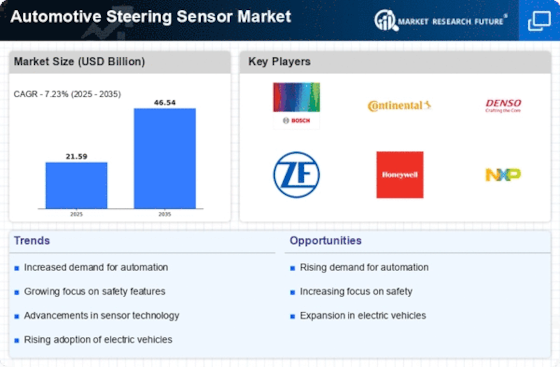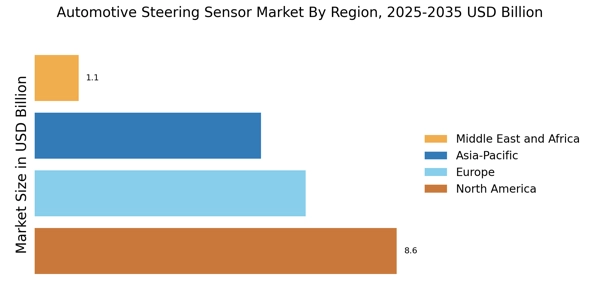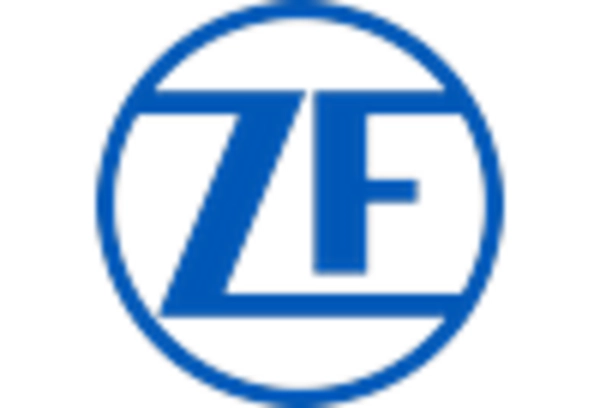Growth of Electric and Hybrid Vehicles
The Automotive Steering Sensor Market is poised for growth due to the rising popularity of electric and hybrid vehicles. These vehicles often incorporate advanced steering technologies that require precise sensor inputs for optimal performance. As the market for electric vehicles (EVs) expands, driven by consumer demand for sustainable transportation options, the need for automotive steering sensors is expected to increase correspondingly. Data indicates that the EV market is anticipated to grow at a CAGR of over 20% in the coming years. This trend suggests that manufacturers will increasingly integrate steering sensors into their electric and hybrid models, thereby enhancing the overall driving experience and contributing to the growth of the Automotive Steering Sensor Market.
Regulatory Compliance and Safety Standards
The Automotive Steering Sensor Market is significantly influenced by stringent regulatory compliance and safety standards imposed by various authorities. Governments worldwide are mandating the incorporation of advanced safety features in vehicles, which includes the use of steering sensors. For instance, regulations aimed at reducing road accidents and enhancing vehicle stability are pushing manufacturers to adopt steering sensor technologies. This regulatory landscape is expected to create a robust demand for automotive steering sensors, as compliance with safety standards becomes a critical factor for manufacturers. The market is likely to witness a steady increase in sensor adoption as companies seek to align their products with these evolving regulations, thereby fostering growth in the Automotive Steering Sensor Market.
Technological Innovations in Sensor Technology
The Automotive Steering Sensor Market is benefiting from rapid technological innovations in sensor technology. Advancements in sensor design, such as the development of more compact and efficient sensors, are enabling manufacturers to enhance vehicle performance and safety. Innovations like MEMS (Micro-Electro-Mechanical Systems) sensors are becoming increasingly prevalent, offering improved accuracy and reliability. These technological advancements are likely to drive the adoption of steering sensors in various vehicle models, as manufacturers seek to leverage cutting-edge technology to differentiate their products. The ongoing research and development in sensor technology suggest a promising future for the Automotive Steering Sensor Market, as new solutions emerge to meet the evolving demands of the automotive sector.
Consumer Preference for Enhanced Vehicle Control
The Automotive Steering Sensor Market is significantly influenced by consumer preferences for enhanced vehicle control and driving experience. As drivers increasingly seek vehicles that offer superior handling and responsiveness, the demand for advanced steering systems equipped with high-performance sensors is on the rise. This trend is particularly evident in the luxury and performance vehicle segments, where consumers are willing to invest in technologies that provide a more engaging driving experience. Market analysis indicates that the demand for vehicles with advanced steering capabilities is expected to grow, thereby driving the need for automotive steering sensors. As manufacturers respond to these consumer preferences, the Automotive Steering Sensor Market is likely to witness sustained growth in the coming years.
Increasing Demand for Advanced Driver Assistance Systems
The Automotive Steering Sensor Market is experiencing a notable surge in demand for advanced driver assistance systems (ADAS). These systems enhance vehicle safety and driving comfort, leading to a growing preference among consumers for vehicles equipped with such technologies. According to recent data, the ADAS market is projected to grow at a compound annual growth rate (CAGR) of approximately 10% over the next five years. This growth is likely to drive the adoption of automotive steering sensors, which are integral to the functionality of ADAS. As manufacturers strive to meet consumer expectations for safety and convenience, the integration of steering sensors into vehicles is becoming increasingly prevalent, thereby propelling the Automotive Steering Sensor Market forward.
















